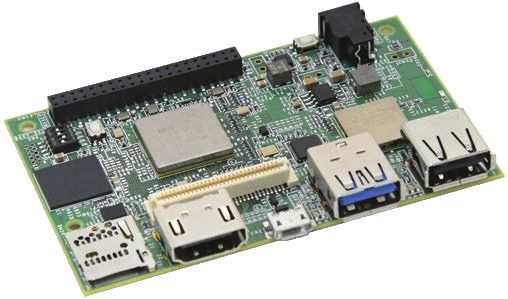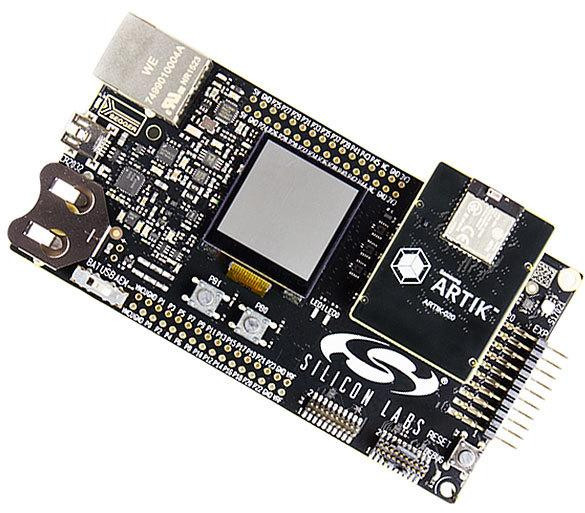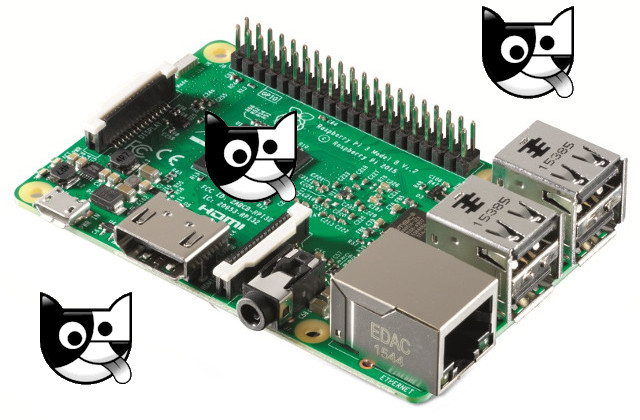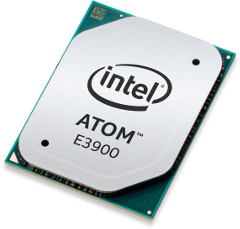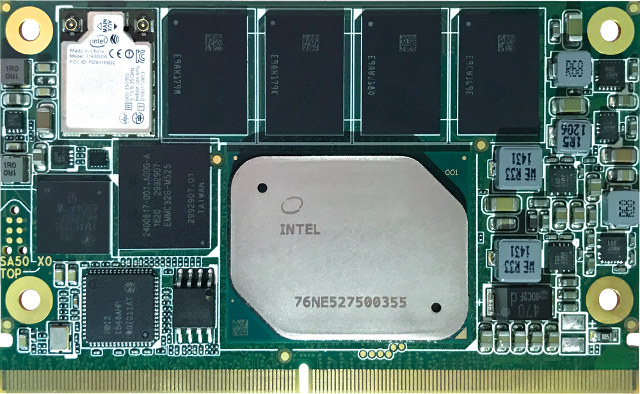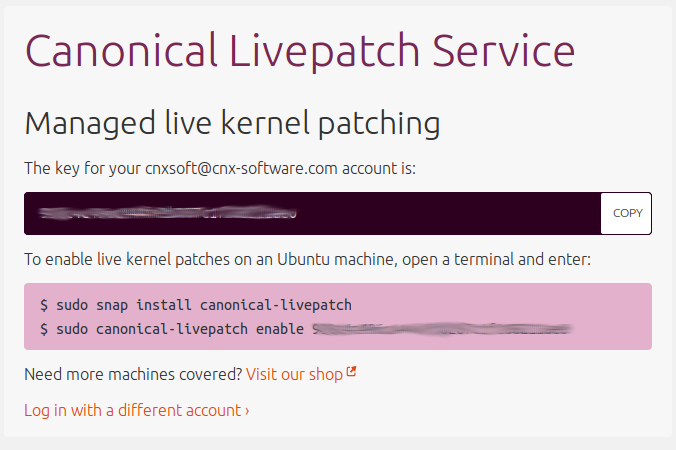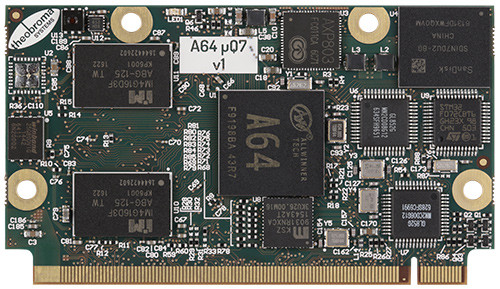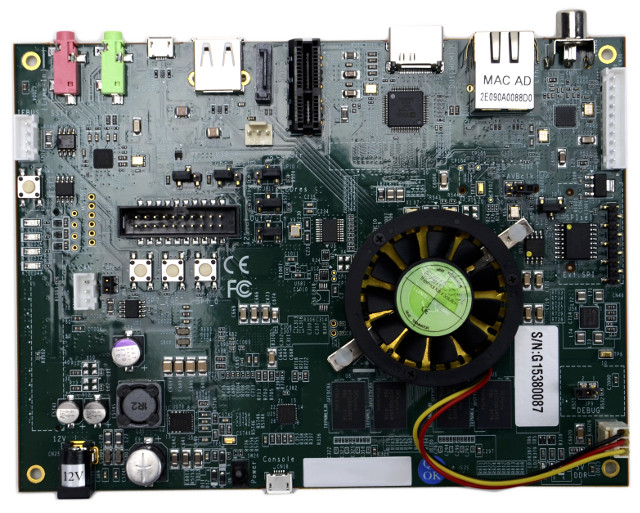While 96Boards platforms may not be selling like Raspberry Pi boards, the form factor is quite popular with vendors, as there are now around 10 development board either directly supported by 96Boards, or at least compliant for the form factor. Fujitsu has also made their own 96Boards compliant F-Cue board powered by SocioNext MB86S71 quad core Cortex A15/A7 processor, as well as F-Cue extension board with Ethernet & PCIe interfaces. F-Cue board specifications: SoC – Socionext MB86S71 big.LITTLE quad core processor with 2x Cortex-A15 cores @ 1.2GHz, 2x Cortex-A7 cores @ 800MHz, and Mali-T624 GPU System Memory – 2GB LPDDR3 1333MHz Storage – 16GB eMMC 4.51 flash, micro SD 3.0 UHS-I slot Video & Audio Output – HDMI 1.4b Multimedia Capabilities – 1080p@30fps encode/decode, 4 stream H.264 decode; 32k x 32k JPEG codec Connectivity – 802.11 a/b/g/n/ac WiFi , Bluetooth 4.2 USB – 1x USB 3.0 host port, 1x USB […]
Samsung Introduces $5 ARTIK 0 and $50 ARTIK 7 Smart IoT Module Families
Samsung unveiled ARTIK 1, 3 and 5 boards for the Internet of Things in 2015, and started to sell them, together with development with WiFi, BLE and Zigbee connectivity earlier this year. The Korean company has now announced two new family with ARTIK 0 modules powered by an ARM Cortex-M MCU and destined to be used in HVAC, lighting, industrial sensors, personal health monitoring and more, as well as ARTIK 7 family powered by an Octa-core Cortex A53 processor, and targeting IoT gateways. ARTIK 0 Family ARTIK 0 family is now comprised for ARTIK 020 with Bluetooth, and ARTIK 030 for applications requiring Thread and/or Zigbee. Beside the different radios, both modules share the same key features: MCU – ARM Cortex-M4 up to 40 MHz with Floating Point Unit, 256KB flash, 32 KB SRAM, advanced hardware cryptographic engine with support for AES-128/-256, ECC, SHA-1, SHA-256, and a Random Number Generator […]
Quirky Linux 8.1 Lightweight Linux Desktop Distribution Released for Raspberry Pi 2 and Pi 3
Barry Kauler, the creator of Puppy Linux, may have retired from maintaining Puppy Linux a few years ago, but he appears to be still active, as he’s just released Quirky Linux 8.1 for Raspberry Pi 2 and Pi 3 boards, a lightweight Linux desktop distribution based on Ubuntu Xenial Xerus 16.04, and including LibreOffice & Inkscape to have the same out of the box experience as Raspbian, but with a 360 MB download size instead of 1.3 GB for Raspbian. A build for ODROID-XU4 development board should also be coming soon. The image has been designed for 8GB micro SD card, and needs to extracted and dumped onto the card with the usual Win32DiskImager or dd tools. There are three mirrors for quirky-pi2-sd-8gb-xerus-8.1.img.xz firmware: iBiblio.org, nluug.nl, and archive.org. You can read the full release notes if you want more details. In case you don’t have a spare micro SD card, […]
Intel Introduces 3 Atom E3900 Apollo Lake Processors for IoT, Industrials and Automotive Applications: x5-E3930, x5-E3940, x7-E3950
Intel previously introduced Celeron and Pentium Apollo Lake processors for laptops and mini PCs, and it seemed Atom was gone for good from that processor family, but the vendor has now introduced Atom E3900 “Apollo Lake” processor family for IoT, industrial and automotive applications with three models: x5-E3930, x5-E3940, and x7-E3950. All three new processors will support up to 8 GB of LPDDR4/DDR3L memory, come in a FCBGA1296 package, be manufactured using 14 nm process, support 4K UHD video output up to 60 Hz on three independent displays, up to 15 simultaneous 1080p30 video stream, as well as 13MP cameras for photos and 1080p60 video capture. Peripherals interfaces include SATA 3.0, PCIe lane, HDMI, DisplayPort, embedded DisplayPort, USB 3.0 & 2.0 ports and more. The new processors also integrate Intel Time Coordinated Computing (TCC) Technology that “coordinates and synchronizes peripherals and networks of connected devices, achieving improved determinism. It can […]
Congatec Unveils conga-SA5 SMARC 2.0 Modules based on Intel “Apollo Lake” Atom x5/x7, Celeron and Pentium Processors
congatec, a company specialized in embedded computer modules, single board computers and embedded design and manufacturing services, has just introduced their conga-SA5 system-on-module family compliant with SMARC 2.0 specifications, and powered by the latest Intel Apollo Lake processors. conga-SA5 SoM’s specifications: SoC (one of the list) Intel Atom x7-E3950 quad core processor @ 1.6 / 2.0 GHz with 2MB L2 cache, 18 EU Intel Gen 9 HD Graphics (12W TDP) Intel Atom x5-E3940 quad core processor @ 1.6 / 1.8 GHz with 2MB L2 cache, 12 EU Intel Gen 9 HD Graphics (9W TDP) Intel Atom x5-E3930 dual core processor @ 1.3 / 1.8 GHz with 2MB L2 cache 1MB, 12 EU Intel Gen 9 HD Graphics (6.5W TDP) Intel Celeron N3350 dual core processor @ 1.1 / 2.4 GHz with 1MB L2 cache, 12 EU Intel Gen 9 HD Graphics (6W TDP) Intel Pentium N4200 quad core processor @ […]
Canonical Livepatch Service Automatically Updates Ubuntu 16.04 LTS (and later) with the Latest Kernel without Rebooting
Installing or upgrading packages in Linux distributions does not normally require rebooting your system, except for the Linux kernel and drivers. But since Linux 4.0 kernel, Live Kernel patching is possible, meaning Linux kernel updates can be performed without having to reboot your server or computer. Canonical is now taking advantage of this new feature with their Livepatch Service available for Ubuntu 16.04 LTS and greater. If you want to enable it on your machine, you’ll have to authenticate to Livepatch portal to get a key / token for the service as shown in the screenshot above. Now you can install the service:
|
1 |
sudo snap install canonical-livepatch |
and enable it with your token:
|
1 2 |
sudo canonical-livepatch enable [your-token] Successfully enabled device. Using machine-token: [your-token] |
That’s it. Your can check Livepatch service status with the command:
|
1 2 3 4 5 6 7 8 9 10 11 12 13 14 15 16 |
canonical-livepatch status --verbose client-version: "5" machine-id: [your-machine-id] machine-token: [your-machine-token] architecture: x86_64 cpu-model: AMD FX(tm)-8350 Eight-Core Processor last-check: 2016-10-25T19:35:55.009247615+07:00 boot-time: 2016-10-25T09:00:09+07:00 uptime: 10h52m7s status: - kernel: 4.4.0-45.66-generic running: true livepatch: state: nothing-to-apply version: "" fixes: "" |
In my case, an update was not necessary, but if there’s one you should see something like:
|
1 2 3 4 |
livepatch: state: applied version: "12.2" fixes: '* CVE-2012-6828' |
That way you can make sure your system always […]
Theobroma Systems Introduces Micro Qseven Allwinner A64 System-on-Module
Theobroma Systems, an Austrian based engineering services and embedded systems solutions company, has been designing Allwinner based systems-on-module compliant with Micro Qseven standard for a while, starting with Allwinner A31 A31-μQ7 module in 2015. The company has now launched A64-μQ7 system-on-module powered by Allwinner A64 quad core Cortex A53 processor. A64-μQ7 module specifications: SoC – Allwinner A64 quad core ARM Cortex A53 processor with Mali-400MP2 GPU System Memory – Up to 2GB DDR3 on module Storage – Up to 64GB eMMC flash, Up to 16MB SPI NOR flash Display I/F (via edge connector) – HDMI 1.4 up to 4K @ 30 Hz, MIPI DSI up to 1920×1200 @ 60 Hz Connectivity – 10/100/1000 Mbps PHY USB – 7x USB 2.0 ports including one dual-role port Other I/Os – On-module communication offload controller for CAN, UART, 8x GPIO, I2S, I2C, SMBus, SPI, FAN Security – Optional Global Platform 2.2.1 compliant JavaCard […]
Renesas SK-RZG1M Board Powered by R8A7743 Processor Gets Mainline Linux Support
Another board has gotten initial mainline Linux support recently, with Renesas SK-RZG1M starter kit board based on Renesas RZ/G1M dual core ARM Cortex A15 SoC with 2GB RAM, a SATA interface, HDMI, LVDS, AV Ethernet bridge, and more. Renesas SK-RZG1M starter kit board actually has the exact same features as Renesas R-Car M2 Porter board except for the processor: SoC – Renesas RZ/G1M (R8A7743) dual core ARM Cortex-A15 processor @ 1.5GHz with PowerVR SGX544MP2 3D GPU, Renesas 2D graphics processor System Memory – Dual channel 2GB DDR3 Storage – On-board 4 MB SPI, and 64 MB SPI, 1x SATA rev 3.1 connector, 1x SD card slot, and 1x micro SD card slot Video Output / Display I/F – HDMI (via ADV7511), and LVDS + touchscreen Analog Video In – ADV7180 video decoder with RCA jack, NTSC/PAL/SECAM autodetection Audio codec – AK4643EN with 3.5mm jacks for Line In and Line Out Connectivity […]


